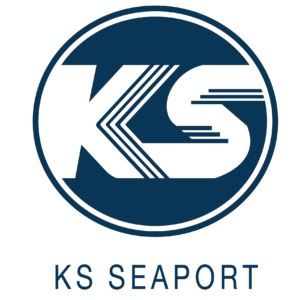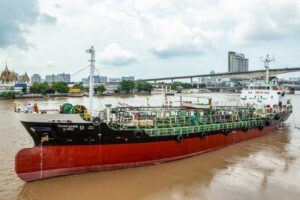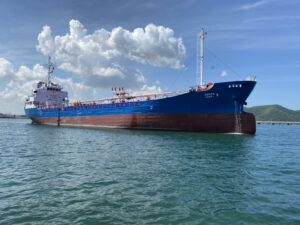The role of a bunker surveyor in the maritime industry has become increasingly pivotal, especially with the advent of new regulations and standards. This industry, crucial to global trade, is continually evolving, adapting to both technological advancements and stringent environmental regulations. At the forefront of these changes is the International Maritime Organization’s (IMO) 2020 regulations, a significant shift that has reshaped practices within the sector.
A bunker surveyor, by definition, is a specialist tasked with the critical responsibility of inspecting and verifying the quantity and quality of fuel oil, or ‘bunkers’, supplied to ships. Their role extends beyond mere measurement; it encompasses ensuring compliance with international standards, particularly in light of the latest sulfur cap requirements imposed by IMO 2020.
The implications of IMO 2020 are profound, placing bunker surveyors at a crucial juncture where their expertise not only contributes to environmental sustainability but also aligns with the economic interests of shipping companies. As the industry navigates through this new regulatory landscape, the demand for skilled bunker surveyors, knowledgeable in the latest standards and capable of effectively managing the associated challenges, has surged. Their role is now more than a function; it’s a necessity in ensuring the industry’s compliance, efficiency, and continued progression.
Thus, understanding the multifaceted role of a bunker surveyor is essential in appreciating their contribution to the maritime industry, particularly in an era that demands adherence to more stringent environmental norms and operational excellence.

Roles and Responsibilities
The role of a bunker surveyor is multifaceted and integral to the smooth operation of the maritime industry, particularly in the context of the IMO 2020 regulations. These professionals shoulder the responsibility of ensuring that the ships’ fuel, commonly known as bunkers, adhere to the highest standards of quality and regulatory compliance.
Detailed Inspection of Ship’s Fuel
A bunker surveyor’s primary duty is the meticulous inspection of the ship’s fuel. This process involves assessing the fuel’s sulfur content to ensure it complies with the IMO 2020 regulations. This regulation, aiming to reduce sulfur oxide emissions from ships, mandates a maximum sulfur content of 0.50% m/m (mass by mass) in marine fuels worldwide – a considerable reduction from the previous limit of 3.50% m/m. The surveyor uses specialized techniques and equipment to accurately measure sulfur levels, ensuring that the fuel not only meets regulatory standards but also aligns with the vessel’s operational requirements.
Ensuring Compliance with Environmental Standards
In addition to sulfur cap compliance, bunker surveyors are guardians of broader environmental standards. They evaluate the fuel to ensure it doesn’t contain any harmful substances that could contribute to pollution. This role has gained importance as the maritime industry increasingly focuses on reducing its environmental footprint, making compliance with such standards not just a legal obligation but a moral one as well.
Verification of Fuel Quality and Quantity
Disputes over fuel quality and quantity can lead to significant financial losses and legal complications. Bunker surveyors play a pivotal role in preventing these disputes by conducting thorough verifications. They measure the quantity of fuel delivered using calibrated equipment and assess the quality by checking for any discrepancies in properties like density, viscosity, and compatibility. This verification is crucial in preventing disputes and ensuring fair trade practices.
Documentation and Reporting Duties
A key aspect of a bunker surveyor’s role is meticulous documentation and reporting. They are responsible for creating detailed reports that record the quantity and quality of the fuel, along with any discrepancies or non-compliance issues. These reports are vital in case of disputes, claims, or audits. Maintaining clear, accurate, and comprehensive records is essential, as these documents serve as evidence in legal proceedings and compliance checks. This aspect of their work underscores the importance of integrity, attention to detail, and an understanding of legal and industry-specific reporting standards.
In summary, the role of a bunker surveyor extends beyond mere inspection to encompass a broad range of responsibilities that ensure compliance, prevent disputes, and uphold the highest standards of environmental responsibility. Their work is pivotal in maintaining the integrity and sustainability of the maritime industry in an era marked by stringent regulations and heightened environmental awareness.

Skills and Qualifications
The role of a bunker surveyor demands a specific set of skills and qualifications, especially in the context of the evolving maritime industry regulations. This section outlines the essential educational background, key skills, and necessary certifications that define a proficient bunker surveyor.
Educational Background and Specialized Training
A solid educational foundation in marine engineering, nautical science, or a related field is typically required for a career as a bunker surveyor. This academic background provides a theoretical understanding of maritime operations, fuel systems, and environmental regulations. In response to the new IMO 2020 regulations, specialized training programs have emerged, focusing on the latest fuel types and compliance requirements. These training sessions are crucial for surveyors to stay updated with evolving industry standards and practices.
Key Skills for Bunker Surveyors
- Attention to Detail: Precision is paramount in bunker surveying. The ability to meticulously inspect and record the characteristics of bunker fuel is vital. This includes noting the slightest discrepancies in fuel quality or quantity that could lead to significant compliance issues or disputes.
- Analytical Skills: Bunker surveyors must possess strong analytical skills to assess fuel quality and interpret complex regulations. They need to analyze laboratory test results and make informed decisions based on their findings.
- Adaptability to Regulatory Changes: The maritime industry is subject to frequent regulatory changes, particularly concerning environmental impact. Bunker surveyors must be adaptable, able to quickly understand and implement new regulations, and provide guidance on compliance.
Certifications and Professional Development
In addition to formal education and training, bunker surveyors are often required to hold specific certifications. These may include a Bunker Surveyor Certificate or similar qualifications offered by maritime institutes or industry associations like the International Bunker Industry Association (IBIA). Continued professional development is also important, as it allows surveyors to stay abreast of the latest industry trends, technologies, and regulatory updates.
In essence, becoming a successful bunker surveyor involves a combination of specialized education, development of critical skills, and ongoing professional growth. These elements are essential in ensuring that surveyors can effectively perform their duties and adapt to the dynamic maritime environment.

Challenges in the IMO 2020 Era
The implementation of the IMO 2020 regulations has introduced a new set of challenges for bunker surveyors. These challenges revolve around adapting to new fuel types, navigating intricate compliance requirements, and managing the rising complexity of bunker quality claims.
Adapting to New Fuel Types
One of the most significant shifts brought about by IMO 2020 is the transition to new fuel types, particularly Very Low Sulfur Fuel Oil (VLSFO). Bunker surveyors face the challenge of adapting to these new fuels, which have different properties compared to traditional heavy fuel oil. VLSFO varies widely in composition, which can affect stability, compatibility, and combustion quality. Surveyors must be adept at assessing these new fuel types, understanding their characteristics, and advising on their use to ensure optimal performance and compliance.
Navigating Complex Compliance and Enforcement Scenarios
The new regulations have also created complex compliance scenarios. Bunker surveyors must ensure that the fuel used by vessels meets the 0.50% m/m sulfur cap, and they are often at the frontline of enforcement. This role involves a thorough understanding of the regulations, including exemptions and waivers, and the ability to navigate situations where compliant fuel might not be available. Surveyors must be well-versed in the nuances of international and local regulations and capable of guiding shipping companies through these compliance landscapes.
Dealing with Increased Frequency and Complexity of Bunker Quality Claims
With the introduction of new fuels and stringent regulations, there has been an increase in bunker quality disputes. Bunker surveyors are increasingly called upon to resolve these disputes, requiring them to have a deep understanding of fuel properties and the factors that can lead to quality issues. They must be capable of conducting detailed investigations, collecting evidence, and providing expert opinions. The complexity of these claims often involves navigating technical, legal, and commercial considerations, making the role of the bunker surveyor more challenging and critical than ever.
In summary, the IMO 2020 era has brought significant challenges for bunker surveyors. These professionals must continuously update their knowledge and skills to adapt to new fuel types, stay ahead of complex regulatory frameworks, and efficiently manage the growing frequency and complexity of bunker quality claims. Their role is vital in ensuring that the maritime industry remains compliant, efficient, and environmentally responsible.

Impact on the Shipping Industry
The role of bunker surveyors is instrumental in shaping the shipping industry, especially in the context of evolving fuel standards and regulatory compliance. Their impact is seen in areas such as cost and risk management, ensuring fair trade practices, and the resolution of bunker disputes.
Role in Cost and Risk Management
With the shift to new fuel types like VLSFO, the cost implications for shipping companies are significant. Bunker surveyors play a crucial role in managing these costs by ensuring that the fuel supplied meets the required specifications and quantity. Accurate fuel measurement and quality checks can prevent financial losses stemming from subpar or non-compliant fuel. Moreover, surveyors help manage risk by ensuring that fuel used on board does not pose operational risks, such as engine failures or inefficiencies, which could lead to costly downtime or repairs.
Ensuring Fair Trade Practices and Compliance
Bunker surveyors are key to upholding fair trade practices in the maritime industry. By providing impartial and accurate assessments of bunker deliveries, they ensure that both suppliers and buyers are treated fairly. This role is critical in building trust in commercial relationships and in maintaining the integrity of the industry. Furthermore, their expertise is vital in ensuring compliance with environmental regulations like IMO 2020. Their work helps shipping companies avoid penalties and reputational damage that can arise from non-compliance.
Case Studies on Bunker Disputes and Resolutions
The role of bunker surveyors in resolving disputes has become more prominent under the new regulations. For instance, there have been cases where discrepancies in fuel quality, particularly concerning sulfur content, have led to disputes between ship owners and fuel suppliers. In one such case, a surveyor’s detailed analysis and evidence collection were instrumental in resolving a dispute over fuel that was alleged to exceed the sulfur cap. The surveyor’s report, which included fuel sampling and laboratory analysis, provided the necessary proof to resolve the disagreement in favor of the ship owner.
In another instance, a vessel experienced operational issues due to the incompatibility of mixed fuel batches. The bunker surveyor’s investigation revealed that the mixing of different VLSFO batches caused instability in the fuel, leading to engine problems. The surveyor’s findings were crucial in supporting the ship owner’s claim against the fuel supplier.
These cases highlight the critical role of bunker surveyors in the shipping industry. They not only ensure compliance and fairness but also provide essential expertise in resolving disputes, thereby safeguarding the interests of all parties involved. The impact of bunker surveyors is thus far-reaching, influencing operational efficiency, legal compliance, and commercial fairness in the maritime domain.

Technological Advancements and Best Practices
The field of bunker surveying is continuously evolving, driven by technological advancements and the development of best practices. These changes are pivotal in enhancing the accuracy of fuel measurement and analysis, ensuring compliance, and shaping the future of bunker surveying.
Adoption of Advanced Technologies for Accurate Fuel Measurement and Analysis
Modern bunker surveying now heavily relies on advanced technologies for precise fuel measurement and quality analysis. Digital flow meters, for instance, have become essential tools for accurately measuring the quantity of bunker fuel delivered. These devices offer real-time data and minimize the margin of error, ensuring that both suppliers and receivers have a clear and accurate account of the transaction. In terms of quality analysis, portable fuel testing kits and onboard analyzers allow for immediate assessment of fuel properties, such as viscosity and sulfur content, ensuring compliance with regulations like IMO 2020.
Best Practices from Industry Guides
Industry guides, such as those published by the International Bunker Industry Association (IBIA) and the Baltic and International Maritime Council (BIMCO), provide comprehensive best practices for bunker surveying. These guidelines cover a range of topics, including proper sampling methods, dispute resolution procedures, and compliance checks. For example, the practice of taking representative fuel samples at various stages of the bunkering process is emphasized to ensure that the quality assessment accurately reflects the fuel being used. These guidelines are regularly updated to reflect new regulations and technologies, making them an invaluable resource for bunker surveyors.
- Accurate Fuel Sampling Techniques:
- Ensuring samples are taken at correct points – before, during, and after fuel transfer.
- Use of continuous drip sampling methods for representative sampling.
- Proper labeling, sealing, and documentation of samples for traceability.
- Documentation and Record Keeping:
- Maintaining detailed records of the bunkering process, including time logs, quantity, and any operational issues.
- Keeping accurate bunker delivery notes (BDNs) and fuel testing reports.
- Documenting any deviations or non-compliance instances during fuel delivery.
- Compliance with Environmental Regulations:
- Regularly updating knowledge on local and international regulations, such as IMO 2020 sulfur cap.
- Ensuring fuel complies with emission control area (ECA) requirements.
- Implementing procedures to handle non-compliant fuel situations.
- Dispute Resolution Procedures:
- Steps to follow when discrepancies arise in fuel quantity or quality.
- Use of third-party arbitration or mediation for dispute resolution.
- Guidelines on evidence collection and presentation during disputes.
- Bunker Quantity Surveys:
- Techniques for accurate measurement of fuel, including tank gauging and flow meter usage.
- Understanding and accounting for variables like temperature and density in volume calculations.
- Procedures for bunker reconciliation to cross-check ship and delivery quantities.
- Fuel Quality Analysis:
- Methods for testing fuel properties such as viscosity, density, and sulfur content.
- Guidelines for handling off-specification fuel or incompatible fuel blends.
- Recommendations for onboard fuel treatment and handling procedures.
- Safety and Risk Management:
- Adherence to safety protocols during bunkering operations.
- Risk assessment strategies for new fuel types and bunkering locations.
- Emergency response procedures for fuel spills or accidents.
Future Trends in Bunker Surveying Technology
Looking to the future, several trends are likely to shape bunker surveying technology. One key area is the development of more sophisticated sensors and analytical tools for real-time monitoring of fuel properties. This technology could enable more precise adjustments to fuel blends and ensure optimal engine performance while maintaining regulatory compliance. Additionally, the integration of blockchain technology in fuel supply chains is being explored. This could enhance transparency and traceability in bunker transactions, significantly reducing the likelihood of disputes and fraud.
Artificial intelligence and machine learning are also expected to play a role, potentially being used to analyze patterns in fuel consumption and predict potential issues with fuel quality or compatibility.
In summary, the adoption of advanced technologies and adherence to best practices are fundamental to the modern bunker surveying process. These elements not only improve the accuracy and efficiency of surveying but also ensure that the industry stays ahead of regulatory changes and technological advancements. The future of bunker surveying is set to be more integrated, precise, and reliable, driven by continuous innovation and best practices.

Global Compliance and Regulations
The bunker surveying profession is deeply intertwined with international maritime regulations. Navigating these complex legal waters is a critical aspect of the surveyor’s role, ensuring both global and regional compliance.
Overview of International Maritime Regulations Impacting Bunker Surveying
- IMO 2020 Regulations: The International Maritime Organization’s cap on sulfur in marine fuels to 0.50% m/m, a drastic reduction from the previous 3.50% m/m, is a key regulation affecting bunker surveying. This global standard aims to reduce sulfur oxide emissions, significantly impacting fuel choices and bunkering operations.
- MARPOL Annex VI: The International Convention for the Prevention of Pollution from Ships, particularly Annex VI, governs the prevention of air pollution from ships. It sets limits on sulfur oxide and nitrogen oxide emissions from ship exhaust and prohibits deliberate emissions of ozone-depleting substances.
- Regional Emission Control Areas (ECAs): In certain designated areas, more stringent controls on sulfur emissions are in place. ECAs like the Baltic Sea, North Sea, and areas off the North American coast have stricter sulfur limits, demanding precise fuel compliance.
- Port State Control Regulations: Local regulations at various ports around the world also impact bunkering operations. These may include specific procedures for fuel delivery, reporting requirements, and inspections.
The Role of Bunker Surveyors in Ensuring Compliance
- Verification of Fuel Compliance: Bunker surveyors are responsible for verifying that the fuel supplied to ships meets both global and regional sulfur content requirements. This involves testing fuel samples and ensuring they align with the specified standards.
- Guidance on Regulatory Changes: Surveyors also play a consultative role, advising shipping companies on how to navigate the complexities of varying regional regulations and international standards. This guidance is crucial for ships traveling through different jurisdictions.
- Record Keeping and Reporting: Effective documentation is a key part of compliance. Surveyors ensure that all bunkering operations are thoroughly documented, including fuel specifications, quantities, and any non-compliance issues. These records are essential for inspections and audits by regulatory authorities.
- Inspection and Certification: In some cases, surveyors may be involved in inspecting vessels for compliance certificates, ensuring that they meet the necessary environmental standards set by maritime authorities.
In summary, bunker surveyors play a pivotal role in the global maritime industry by ensuring compliance with a complex web of international and regional regulations. Their expertise not only helps in navigating these legalities but also contributes significantly to the environmental sustainability of maritime operations.
Conclusion
The role of bunker surveyors in the maritime industry has evolved significantly, especially in the face of changing regulatory and environmental landscapes. These professionals stand at the crossroads of operational efficiency, legal compliance, and environmental stewardship, playing a critical role that extends far beyond the traditional scope of fuel inspection.
In the era of IMO 2020 and heightened environmental awareness, bunker surveyors have become indispensable in ensuring that the shipping industry adapts to and complies with stringent sulfur emission standards. Their expertise in assessing new fuel types like VLSFO, navigating complex compliance scenarios, and resolving quality disputes is invaluable. They are not just inspectors but guardians of environmental integrity and fair trade practices in the maritime domain.
Moreover, the integration of advanced technologies and adherence to best practices, as outlined by industry leaders like IBIA and BIMCO, have further enhanced the precision and reliability of bunker surveying. These advancements, coupled with a deep understanding of global and regional regulations, position bunker surveyors as key contributors to the sustainable future of shipping.
As we look ahead, the importance of bunker surveyors will only grow. They will continue to play a pivotal role in guiding the industry through evolving environmental standards and technological innovations, ensuring that the maritime sector remains both compliant and competitive. The expertise and diligence of bunker surveyors are, therefore, more crucial than ever, making them an integral part of the maritime industry’s journey towards a more sustainable and efficient future.












